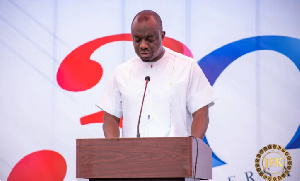Business News of Thursday, 29 July 2021
Source: 3news.com
Eurobond, coronavirus, financial cleanup caused spike in public debt – Ofori-Atta
Finance Minister Ken Ofori Atta has attributed the spike in the public sector debt to coronavirus related expenditure as well as the issuance of the Eurobond in April 2021.
Delivering the 2021 mid-year budget statement in Parliament on Thursday, July 29, he said “The total public debt stock of GDP increased from 76.1 per cent at the end of December 2020 to 77.1 per cent at the end of June 2021. This includes the Financial sector bailout. Excluding the Financial Sector bailout in nominal, terms is 72.9 percent.
“The increase in the debt stock was mainly because of the Eurobond issuance of April 2021, Coronavirus pandemic effect containment liabilities”
Ghana’s public debt stock is reported to have shot up by GHS27.8 billion in April 2021 and May 2021 to ¢332.4 billion.
This is according to the latest Summary of Economic and Financial Data by the Bank of Ghana (BoG)
This is equivalent to $57.9 billion, about 76.66 percent of Gross Domestic Product.
In March 2021, the total debt stock stood at ¢304.6 billion, and the significant increase in the debt stock is due to the $3 billion Eurobond raised in March 2021 as well as the huge borrowing on the domestic market.
In April 2021, the public debt stock was ¢328.0 billion. This means GHS23.4 billion new debt was added to the total debt stock.
In April 2021, Ghana issued an innovative a zero-coupon Eurobond that matures in July 2025. The bond was issued at 78 US cents per dollar of debt to attract investors.
The idea being that debt service obligations between now and 2025 were lower versus issuing a more standard coupon-paying Eurobond.
On the clean-up exercise in the Financial sector, the government expended GH¢21 billion to clean up the banking sector, the President, Nana Akufo-Addo announced in January 2021.
Mr Ofori Atta further told Parliament that for the first time in the history of the fourth republic, the exchange rate did not see a spike after an election year.
He explained that cumulatively, from the beginning of the year to date the exchange rate has depreciated by 0.6 percent against the US dollars and appreciating by 3.6 percent against the Euro.
“For the first time in the fourth republic, the exchange rate did not see a spike after an election year.
“Cumulatively, from the beginning of the year to date the exchange rate has depreciated by 0.6 percent against the US dollars and appreciating by 3.6% against the Euro," he stressed.
He further told the House that he did not come to ask for more money from the House in the mid-year budget.
He also said he did not come for more taxes rather, he came to update the House and the country on the performance of the economy during the first half of the year.
“I have not come here today to ask for more money, I have not come to ask for more taxes, I have come to update the house on the performance of the economy for the first half of the year,” he said amidst claps from members of Parliament.
Touching how the government has managed the impact of the Covid on the economy, he stated that the Akufo-Addo administration took bold and decisive measures to deal with the negative impact of the covid on the economy.
Mr Ofori-Atta told the House that the huge negative impact of Covid on the global economy was to be expected because no country around the world expected a pandemic of this magnitude.
However, he said governments around the world including that of Ghana acted with prudent measures to deal with the situation.
“The hardship of Covid 19, the stress, negative impact on employees and employers was unprecedented but expected because no country in the work had prepared for it.
“We took responsible, innovative and decisive and bold actions to tackle the crisis,” he said.
As part of efforts to deal with the effect of the Covid on the local economy, the central bank unexpectedly cut its benchmark interest rate to the lowest in more than nine years to support the recovery of the economy.
The monetary policy committee reduced the rate to 13.5% from 14.5%, Governor Ernest Addison told reporters on Monday in Accra, the capital. All four economists in a Bloomberg survey expected the rate to remain unchanged.
Ghana’s central bank was one of the first in sub-Saharan Africa that stepped in last year by cutting lending rates to shield the economy from the fallout of plunging oil prices and lockdowns to curb the spread of the Covid-19 pandemic. While the 150 basis-point cut announced in March 2020 was the last monetary policy support it provided and output expanded at the slowest pace in 37 years, the West African economy still fared better than most of its peers, where gross domestic product contracted.
Economic activity has picked up strongly, even as new taxes that were implemented this month weighed on consumer and business confidence, Addison said. GDP could expand by 4.6% this year, according to International Monetary Fund projections.
Inflation dropped to a 13-month low of 8.5% in April, moving close to the centre of the central bank’s target range as food-cost growth eased. That’s after the rate was above the target band of 6% to 10% for most of the past year. The MPC expects the rate of price growth to reach the midpoint of the target range by June.
Positive moves in the economy and on the direction of inflation, as well as the fact that the risks associated with last year’s election are over, gave the MPC room to bring down the policy rate to signal progress, Addison said.











